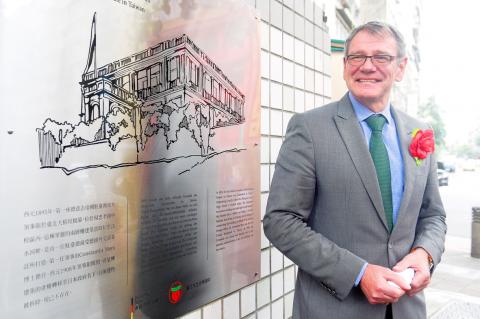The German Institute Taipei yesterday unveiled a memorial plaque on the former site of the Imperial German Consulate in Taiwan in Taipei’s Dadaocheng (大稻埕) area, as it celebrated more than 100 years of ties between the two nations.
The plaque was installed on the wall surrounding Taipei Municipal Zhongxiao Junior High School and features a brief introduction to the consulate’s history in German, Chinese and English.
It also depicts a hand-drawn sketch by a Taiwanese designer of what the consulate looked like in the 19th century.

Photo: George Tsorng, Taipei Times
Due to increasing trade activities between Germany and Taiwan in the 1890s, the two-story consulate building was constructed in 1895 on the banks of the Tamsui River (淡水河) by Taiwan-based German businessman Arthur von Butler on behalf of the then-German Foreign Office, the institute said.
Two German consuls and four interim consuls were stationed at the consulate before it was closed and sold to the Japanese colonial administration in 1908 and torn down, the institute said, adding that the official seal of the consulate used “Formosa” rather than “Taiwan” to refer to the island at the time.
“About 120 years ago, what stood in front of the school’s main gate was the Imperial German Consulate. On the right was the then-US embassy and behind the consulate stood the then-Dutch embassy,” school principal Chen Tse-min (陳澤民) said.
After the institute posted a message on Facebook in October 2016 inquiring about the exact location of the consulate, a few of the school’s history teachers used a digital historical map to try to locate it, only to realize it was located where the faculty office is today, he said.
The discovery motivated the school’s teachers to design a series of teaching materials that seek to take students back to 1895 through a historical tour of Dadaocheng that begins at the site of the former consulate, he added.
Several students have expressed interest in studying in Germany due to the school’s connection with the nation, Chen said.
Institute Director-General Thomas Prinz said that his office started studying the history behind the former consulate as early as 2015.
“Thanks to information provided by the German Federal Foreign Office and the help of many Taiwanese friends, we were able to find the old site of what was known at the time as the ‘most beautiful and magnificent building along the Tamsui River,’” Prinz said.
The school is the “most ideal successor” to the former consulate, he said, expressing the hope that the school and the institute could cooperate to jointly hold events.

The Central Election Commission has amended election and recall regulations to require elected office candidates to provide proof that they have no Chinese citizenship, a Cabinet report said. The commission on Oct. 29 last year revised the Measures for the Permission of Family-based Residence, Long-term Residence and Settlement of People from the Mainland Area in the Taiwan Area (大陸地區人民在台灣地區依親居留長期居留或定居許可辦法), the Executive Yuan said in a report it submitted to the legislature for review. The revision requires Chinese citizens applying for permanent residency to submit notarial documents showing that they have lost their Chinese household record and have renounced — or have never

A magnitude 5.6 earthquake struck off the coast of Yilan County at 12:37pm today, with clear shaking felt across much of northern Taiwan. There were no immediate reports of damage. The epicenter of the quake was 16.9km east-southeast of Yilan County Hall offshore at a depth of 66.8km, Central Weather Administration (CWA) data showed. The maximum intensity registered at a 4 in Yilan County’s Nanao Township (南澳) on Taiwan’s seven-tier scale. Other parts of Yilan, as well as certain areas of Hualien County, Taipei, New Taipei City, Taoyuan, Hsinchu County, Taichung and Miaoli County, recorded intensities of 3. Residents of Yilan County and Taipei received

Taiwan has secured another breakthrough in fruit exports, with jujubes, dragon fruit and lychees approved for shipment to the EU, the Ministry of Agriculture said yesterday. The Animal and Plant Health Inspection Agency on Thursday received formal notification of the approval from the EU, the ministry said, adding that the decision was expected to expand Taiwanese fruit producers’ access to high-end European markets. Taiwan exported 126 tonnes of lychees last year, valued at US$1.48 million, with Japan accounting for 102 tonnes. Other export destinations included New Zealand, Hong Kong, the US and Australia, ministry data showed. Jujube exports totaled 103 tonnes, valued at

BIG SPENDERS: Foreign investors bought the most Taiwan equities since 2005, signaling confidence that an AI boom would continue to benefit chipmakers Taiwan Semiconductor Manufacturing Co’s (TSMC, 台積電) market capitalization swelled to US$2 trillion for the first time following a 4.25 percent rally in its American depositary receipts (ADR) overnight, putting the world’s biggest contract chipmaker sixth on the list of the world’s biggest companies by market capitalization, just behind Amazon.com Inc. The site CompaniesMarketcap.com ranked TSMC ahead of Saudi Aramco and Meta Platforms Inc. The Taiwanese company’s ADRs on Tuesday surged to US$385.75 on the New York Stock Exchange, as strong demand for artificial intelligence (AI) applications led to chip supply constraints and boost revenue growth to record-breaking levels. Each TSMC ADR represents